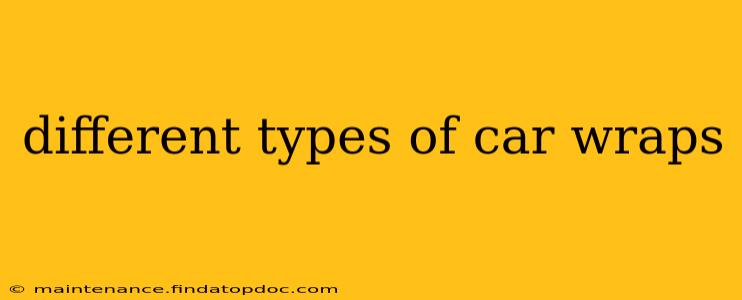Car wrapping has exploded in popularity, offering a fantastic way to personalize your vehicle and protect its paint. But with so many options available, choosing the right car wrap can be overwhelming. This comprehensive guide explores the different types of car wraps, their pros and cons, and helps you decide which one best suits your needs and budget.
What are the different types of car wrap vinyl?
Several types of vinyl are used for car wraps, each with unique properties affecting durability, appearance, and cost. Let's delve into the most common:
1. Cast Vinyl Wraps: The Premium Choice
Cast vinyl is the top-tier option, known for its exceptional durability, flexibility, and ability to conform to complex curves and contours of vehicles. This makes it ideal for full vehicle wraps, especially those with intricate details or requiring a long lifespan. Cast vinyl is thicker and more resistant to stretching and tearing than calendared vinyl. It’s a premium choice, reflecting in its higher cost.
Pros: Superior durability, excellent conformability, long lifespan, resists scratches and tears.
Cons: More expensive than calendared vinyl, more challenging to install (requiring experienced installers).
2. Calendared Vinyl Wraps: The Budget-Friendly Option
Calendared vinyl is a more economical choice, offering a good balance between cost and performance. It's thinner and less flexible than cast vinyl, making it suitable for simpler wraps and less complex vehicle shapes. While it offers good protection, it's less durable and prone to cracking or tearing on sharp curves.
Pros: Affordable, relatively easy to install.
Cons: Less durable than cast vinyl, less conformable, prone to cracking on sharp curves, shorter lifespan.
3. Matte Wraps: The Subtle Sophistication
Matte wraps offer a sleek, understated look, popular among those who prefer a non-reflective finish. They provide a unique texture, different from the glossy shine of traditional paint. Both cast and calendared vinyl can be matte, so durability depends on the vinyl type.
Pros: Stylish, non-reflective finish, hides imperfections.
Cons: Can show more dirt and dust than glossy wraps, more challenging to clean.
4. Glossy Wraps: The Classic Shine
Glossy wraps provide a vibrant, reflective finish, enhancing the color and giving a striking visual impact. Similar to matte wraps, glossy finishes are available in both cast and calendared vinyl types, with cast offering superior durability.
Pros: Vibrant, reflective finish, easy to clean.
Cons: Shows scratches and imperfections more easily than matte wraps.
5. Satin Wraps: The Balanced Look
Satin wraps provide a happy medium between matte and gloss, offering a subtle sheen without the intense reflection of a glossy wrap. They offer a sophisticated and elegant appearance. Again, both cast and calendared vinyl can be finished in satin.
Pros: Elegant appearance, less prone to showing imperfections than glossy wraps.
Cons: May still show some imperfections.
What about different types of finishes besides matte, glossy, and satin?
Beyond the basic matte, gloss, and satin finishes, you'll also find a variety of specialized finishes, including:
- Chrome wraps: These create a metallic, mirror-like finish.
- Carbon fiber wraps: These mimic the look of actual carbon fiber, a popular choice for sporty vehicles.
- Brushed metal wraps: Offer a textured metallic look.
- Textured wraps: These simulate different textures like leather, wood, or even concrete.
What type of car wrap is best for me?
The best type of car wrap for you depends on several factors:
- Your budget: Calendared vinyl offers a more budget-friendly option, while cast vinyl is a premium investment.
- Your vehicle's shape: Cast vinyl is crucial for vehicles with complex curves, ensuring a seamless wrap.
- Your desired lifespan: Cast vinyl will last significantly longer.
- Your aesthetic preferences: Choose the finish (matte, gloss, satin, etc.) that best reflects your style.
How long does a car wrap last?
The lifespan of a car wrap depends on the type of vinyl used and the care it receives. A well-maintained cast vinyl wrap can last 5-7 years, while calendared wraps typically last 3-5 years. Proper installation and maintenance are key to maximizing the lifespan of your wrap.
Can I remove a car wrap myself?
While it's possible, it's highly recommended that you have a professional remove your car wrap. Improper removal can damage your vehicle's paint. Professionals have the expertise and tools to remove the wrap safely and efficiently.
Does a car wrap damage the paint?
A professionally installed and removed car wrap should not damage your vehicle's paint. However, improper installation or removal can lead to paint damage, so choosing a reputable installer is essential.
This comprehensive overview provides a solid understanding of the diverse world of car wraps. By considering these factors, you can confidently choose the perfect wrap to transform your vehicle and reflect your personal style.
